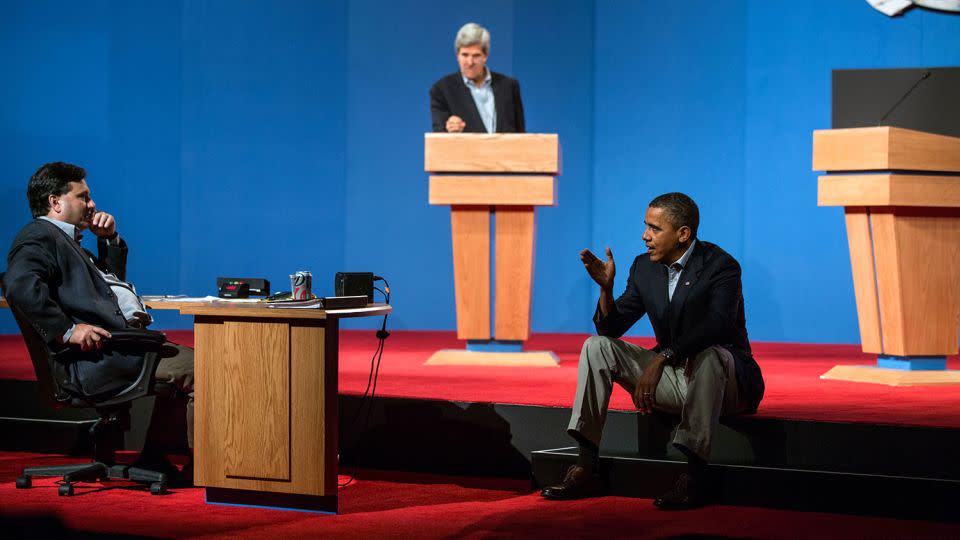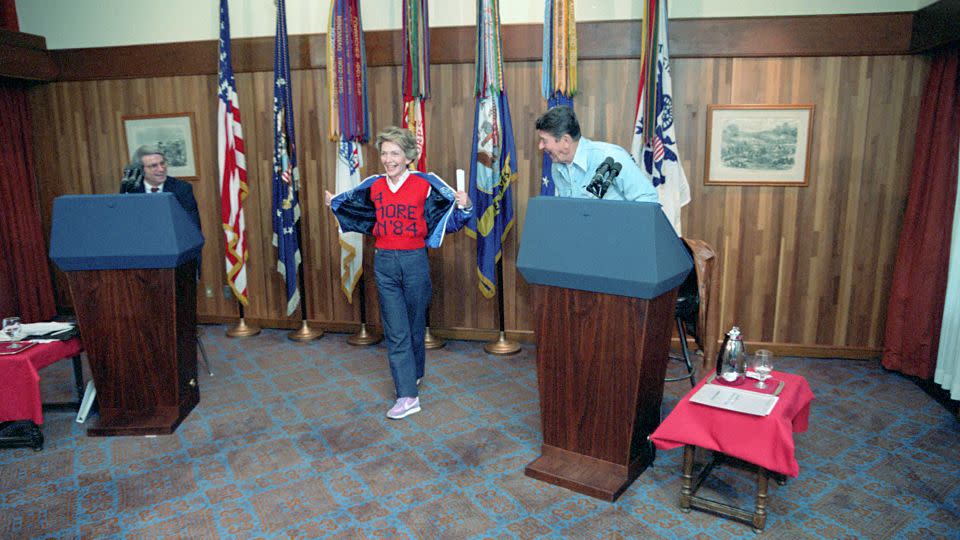First debate of the cycle has a history tripping up former presidents
- Oops!Something went wrong.Please try again later.
- Oops!Something went wrong.Please try again later.
- Oops!Something went wrong.Please try again later.
- Oops!Something went wrong.Please try again later.
- Oops!Something went wrong.Please try again later.
- Oops!Something went wrong.Please try again later.
Joe Biden was on cleanup duty.
The day was October 4, 2012, the morning after Barack Obama had turned in a debate performance so bad even Obama himself would come to judge it a “stinker.”
Flat, convoluted and passive, Obama’s turn at the podium was calamitous enough that aides backstage appeared paralyzed before emerging reluctantly to face reporters in the spin room.
It was left to Biden, the vice president, to stand outside a grocery store in Iowa and find a charitable way of describing his boss’s performance.
“He was presidential,” Biden offered, acknowledging later what had by then become obvious: “All debates are tough.”
Twelve years later, the memory of Obama’s tortured outing in Denver is lingering in the background as Biden undergoes practice sessions at Camp David ahead of his own first debate as an incumbent as he faces off with former President Donald Trump on Thursday in Atlanta.
Biden’s team — some of whom helped prepare Obama for his debates — undoubtedly hopes to elude a curse afflicting incumbents going back at least four decades: a weak first debate that left an opening for their rivals to gain the initiative.
“Presidents are steeped in prose. They haven’t debated in four years, they know a lot and they tend to want to defend their records,” said David Axelrod, a CNN contributor who served as a senior adviser to Obama and helped prepare him for the debates. “The wildcard here is Trump, who is also a former president and hasn’t debated in four years.”
Televised debates have long been a storied part of presidential campaigns, with history-making moments for candidates. Sitting presidents face the added challenge of delivering strong performances on a rare night the trappings of the office are set aside and they come face-to-face with their rivals.

Unaccustomed to such direct and hostile confrontation after the insulated deference of the Oval Office and Air Force One, presidents are rarely forced to square off in public. In the past, that has translated into first debate performances that seem flat-footed, meandering — or, in the case of Obama, contemptuous of the entire exercise.
Trump himself fell victim to the first-debate curse in 2020, when he arrived to the stage in Cleveland looking slightly unwell (he tested positive for Covid a few days later) and proceeded to hector and interrupt Biden until the Democrat told him to “shut up.” Trump later told aides he felt he could have been less aggressive.
Biden is hardly entering the showdown at CNN’s studio in Atlanta expecting deference from Trump. And unlike past incumbents, he is facing a rival who himself has been insulated in a world of obeisance since he left the White House.
This year, for the earliest debate in memory, neither candidate has the benefit of any recent real-world practice. Trump skipped this year’s Republican primary debates, passing up a training exercise past challengers have enjoyed.
In some ways, that puts both men on equal footing when they walk onto Thursday’s debate stage.
“You have two people who don’t like each other very much, so the question becomes can they keep the debate centered on issues rather than themselves?” said Brett O’Donnell, a Republican strategist who has spent years preparing presidents and candidates for debates.

Ronald Reagan, who like Biden retreated to Camp David for debate preparations in 1984, did not appear to his aides entirely engaged in the exercises. When briefing books were left out for him to peruse at night, they were found in exactly the same place the next morning — cast aside while Reagan watched movies.
Walking off the debate stage after a rambling final answer, Reagan confessed to aides that he’d flopped. So bad was the performance that at a news conference two days later, the Republican National Committee chairman was reduced to explaining “it wasn’t because of any physical or mental deficiency.”
While Reagan went on to defeat Walter Mondale in a 49-state landslide, the first debate served as a nerve-racking wakeup call inside the White House.
Eight years later, George H.W. Bush failed to land punches while on-stage with Bill Clinton. Unlike Reagan, however, he wasn’t able to dramatically improve his performance by the second debate, when he was caught on camera glancing at his watch while Clinton was engaging with an audience member’s question about the recession.
“Was I glad when the damn thing was over? Yeah, and maybe that’s why I was looking at it, only 10 more minutes of this crap,” Bush would recount later — after he’d lost the election.
Clinton is the one incumbent over the last several decades who avoided the first-debate curse. His successor, George W. Bush, wasn’t so lucky: his first face-off with John Kerry in 2004 was marred by scowls, smirks and the general sense that he was surprised to be confronted by someone after four years in the presidential bubble.
For Obama, the disastrous showing in 2012 came down to a variety of factors. He was distracted in the lead-up by the duties of the presidency, yes, but also disdainful of performative politics and displeased at having to stand as Republican candidate Mitt Romney’s equal on stage.

“They are out of practice and they are treated with such deference usually, it’s discomforting,” Axelrod said in an interview. “It throws them off their game to treat them with no deference at all.”
Over a weekend of prep sessions outside Las Vegas, where an exact replica of the debate stage was constructed inside a hotel ballroom, Obama openly complained about how bored he was. He escaped at one point to visit the Hoover Dam.
“It’s a drag,” he told a group of reporters who’d tailed him to Nevada. “They’re making me do my homework.”
Walking off the debate stage in Denver, Obama did not initially realize just how bad his confrontation with Romney had gone. It was only later, after being forced to review videotape of the encounter, did he come to recognize the extent of the damage.
“On Social Security, we’ve got a somewhat similar position,” Obama told Romney during one of the exchanges that caused Obama’s advisers to cringe.
Obama ultimately blamed himself for the poor outing. When the aide who led his practice sessions in Las Vegas, Ron Klain, volunteered to resign, Obama rejected the offer.
Twelve years later, Klain spent this past weekend at Camp David, helping Biden prepare to face Trump.
For more CNN news and newsletters create an account at CNN.com

